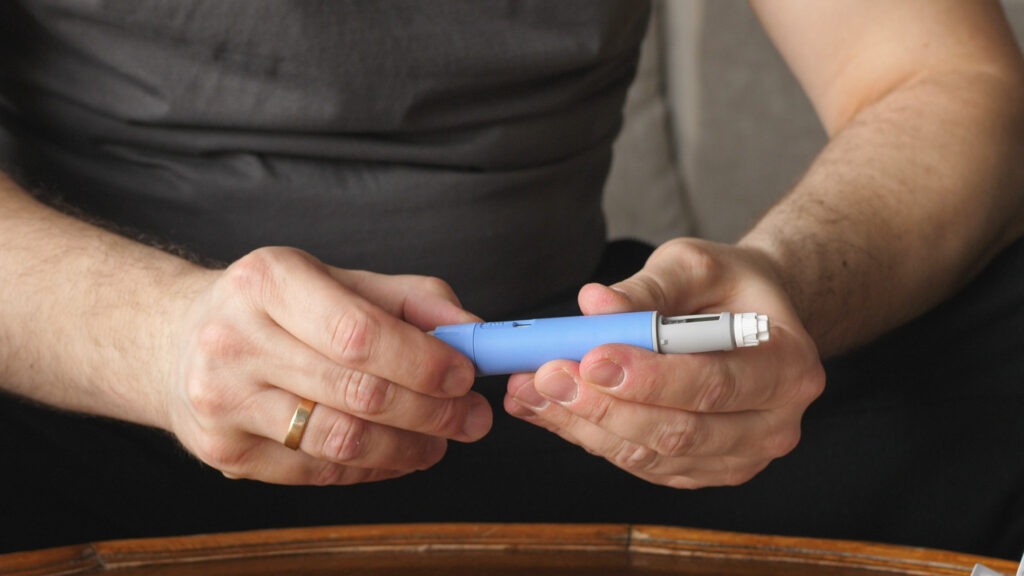Patients fast before surgery to prevent food from getting into their lungs while they’re under — a serious concern that can lead to lung infection. But for those taking a class of treatments that include the widely popular Ozempic and Wegovy, fasting may not be enough to ensure an empty stomach.
The American Society of Anesthesiologists issued guidance Thursday recommending that patients stop taking this class of treatments, called GLP-1 drugs, before undergoing surgery.
advertisement
Though there is limited data on how these drugs affect people having surgery, there are concerns — based on anecdotal reports — that delayed stomach emptying caused by these drugs could increase the risk of regurgitation and food aspiration into lungs when patients are on anesthesia, the group said.
GLP-1 drugs for type 2 diabetes and obesity have exploded in popularity for their ability to significantly cut people’s weight. They mimic the effects of the glucagon-like peptide 1 hormone that help people feel full after eating. The class of treatments, which include Novo Nordisk’s Ozempic and Wegovy and Eli LIlly’s Mounjaro, have gastrointestinal side effects like nausea, vomiting and delayed stomach emptying.
Michael Champeau, president of the anesthesiologist group, said they’ve heard anecdotes such as doctors performing endoscopies in patients taking these drugs and seeing food in the stomach, patients vomiting up food before surgeries even though they had fasted, and patients who were under anesthesia and had food come up during surgery.
advertisement
Typically the group reviews extensive literature before issuing formal guidelines, but in this case, there were few studies, he said. “We wanted to just get some guidance out there because so many people had been concerned about the issue.”
The group’s statement noted there are reports that the gastric emptying effects are reduced with long-term use of the drugs, but Champeau said there isn’t extensive enough data yet to specify how long patients have had to have been on the drug to be at risk.
“The relationship between how long one has been taking the drug and how much residual gastric content one has, I think, is at this point unpredictable enough that we don’t want to risk the patient’s health,” he said.
Delayed stomach emptying on GLP-1 drugs may also affect how well patients are able to absorb other oral medications they’re taking. The label for Lilly’s Mounjaro recommends patients taking oral birth control to switch to a non-oral form or add an additional method of birth control for the month after they start taking the drug and after each dose escalation. Studies showed that the drug’s effect on gastric emptying was greatest after the first dose and diminished after subsequent doses, according to the label.
The anesthesiologist group said that for people undergoing urgent surgeries, doctors should take precautions assuming that the patient has a full stomach.
For elective procedures, the group recommends that patients who take a daily dose of a GLP-1 drug should hold the treatment the day of surgery, and those who take a weekly dose should hold it the week before surgery.
The group also said that if the patient is experiencing gastrointestinal symptoms like severe nausea, vomiting or abdominal pain or bloating, that doctors should consider delaying the surgery. Some data suggest that the presence of gastrointestinal side effects are linked to how much food there is in the stomach.
If the patient has no gastrointestinal symptoms, but the GLP-1 drug was not held, then doctors should consider using an ultrasound to assess what’s in their stomach, the group said. If the stomach is empty, then doctors can proceed as usual, but if the stomach is full or the ultrasound is inconclusive, then doctors should consider delaying the procedure or adding full stomach precautions.
Anesthesiologists should also discuss the risk of regurgitation and food aspiration with other doctors involved in the surgery and the patient, the group said.
STAT’s coverage of chronic health issues is supported by a grant from Bloomberg Philanthropies. Our financial supporters are not involved in any decisions about our journalism.

